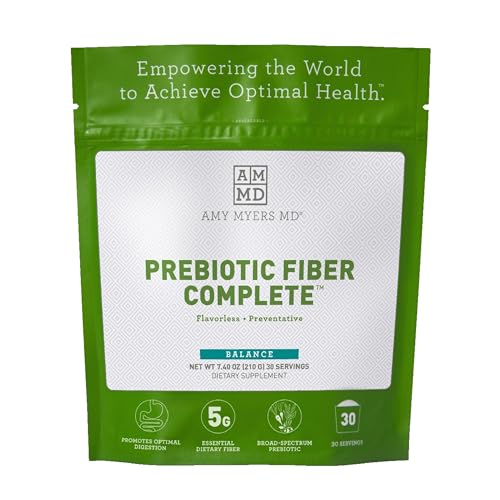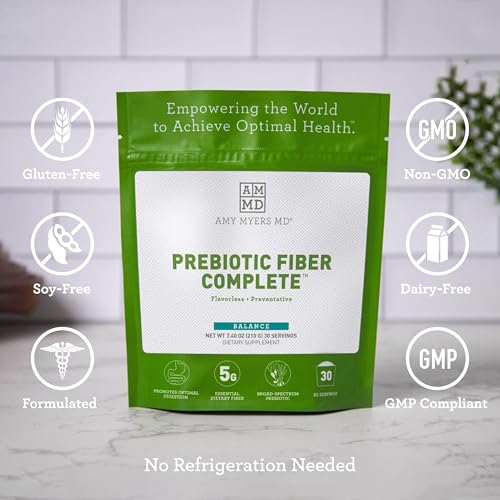

Amy Myers MD Probiotic Fiber Powder - Supports Gut Health, Non-GMO, Gluten-Free - 1 Month Supply


Calcium
Medium RiskCalcium is a chemical element commonly found in various compounds and is essential for biological functions, particularly in bone health and cellular processes. It is utilized in products for its role in maintaining structural integrity and as a dietary supplement.
Sustai Insights
Calcium offers functional benefits such as supporting bone health and acting as a buffering agent in formulations. While generally safe, it presents moderate allergenic potential and concerns regarding persistence and bioaccumulation in the environment. Regulatory bodies have minimal restrictions, indicating a low risk for carcinogenicity and developmental toxicity. Safe usage practices should be adhered to, especially for sensitive populations. Alternatives like plant-based calcium sources may be considered for those seeking sustainable options. Overall, the risk level associated with calcium is assessed as medium.
Inulin
Low RiskInulin is a polysaccharide that functions primarily as a dietary fiber and prebiotic, often used to enhance the texture and nutritional profile of various food products. It is derived from plants like chicory and is known for its ability to improve digestive health and promote beneficial gut bacteria.
Sustai Insights
Inulin offers functional benefits as a prebiotic, supporting gut health and enhancing food texture. It is biodegradable and sustainably sourced from plants, contributing to environmentally friendly practices. Health risks are low, with minimal concerns regarding carcinogenicity and allergies. While regulatory restrictions apply to certain products, overall, the ingredient is considered low risk. Safe usage involves adhering to recommended dietary levels, and alternatives like other soluble fibers can be considered for those seeking different options.
Ascorbic Acid (Vitamin C)
Low RiskAscorbic acid (Vitamin C) is a naturally occurring antioxidant essential for various biological functions, including collagen synthesis and immune response. It is commonly used in cosmetic and food products for its preservative properties and ability to enhance skin brightness.
Sustai Insights
Ascorbic acid provides functional benefits as an effective antioxidant and preservative, contributing to skin health and product stability. It is generally recognized as safe with low health risks, including minimal concerns for carcinogenicity and allergies. Environmentally, it poses low risks, as it is biodegradable and does not bioaccumulate. Regulatory bodies like the FDA have not imposed significant restrictions on its use. Overall, the ingredient presents a low risk, with safe usage practices ensuring consumer safety, and alternatives such as natural extracts exist for those seeking different formulations.
Galactoarabinan
Low RiskGalactoarabinan is a polysaccharide obtained from the larch tree and is commonly used in cosmetic and personal care products. It acts as a humectant and thickening agent, contributing to product texture and moisture retention.
Sustai Insights
Galactoarabinan serves functional benefits as a humectant and thickening agent, enhancing product texture while retaining moisture. It is biodegradable and derived from renewable sources, supporting sustainability. Health risks are low, with no significant concerns regarding carcinogenicity, allergies, or reproductive toxicity. Environmental risks are minimal, as it does not contribute significantly to pollution or bioaccumulation. Regulatory status is favorable, with no current restrictions. Overall, this ingredient is assessed as low risk, making it a suitable choice in formulations.
Fructooligosaccharides
Low RiskFructooligosaccharides are short-chain carbohydrates composed of fructose units. They are commonly used as prebiotics, promoting beneficial gut bacteria and enhancing digestive health. These ingredients are often found in food products and dietary supplements, where they serve to improve flavor and texture while supporting overall gut health.
Sustai Insights
Fructooligosaccharides offer functional benefits as prebiotics, fostering the growth of beneficial gut bacteria. They are generally regarded as safe with low concerns for cancer, allergies, and reproductive toxicity. Environmentally, they are biodegradable and pose minimal ecological risks. Regulatory bodies have not issued warnings, affirming their low-risk status overall. Safe usage involves moderation, and potential alternatives include inulin or other fiber sources. Overall, fructooligosaccharides are assessed as low risk.
Inulin
Low RiskInulin is a polysaccharide that functions primarily as a dietary fiber and prebiotic, often used to enhance the texture and nutritional profile of various food products. It is derived from plants like chicory and is known for its ability to improve digestive health and promote beneficial gut bacteria.
Sustai Insights
Inulin offers functional benefits as a prebiotic, supporting gut health and enhancing food texture. It is biodegradable and sustainably sourced from plants, contributing to environmentally friendly practices. Health risks are low, with minimal concerns regarding carcinogenicity and allergies. While regulatory restrictions apply to certain products, overall, the ingredient is considered low risk. Safe usage involves adhering to recommended dietary levels, and alternatives like other soluble fibers can be considered for those seeking different options.
Calcium
Medium RiskCalcium is a chemical element commonly found in various compounds and is essential for biological functions, particularly in bone health and cellular processes. It is utilized in products for its role in maintaining structural integrity and as a dietary supplement.
Sustai Insights
Calcium offers functional benefits such as supporting bone health and acting as a buffering agent in formulations. While generally safe, it presents moderate allergenic potential and concerns regarding persistence and bioaccumulation in the environment. Regulatory bodies have minimal restrictions, indicating a low risk for carcinogenicity and developmental toxicity. Safe usage practices should be adhered to, especially for sensitive populations. Alternatives like plant-based calcium sources may be considered for those seeking sustainable options. Overall, the risk level associated with calcium is assessed as medium.
Ascorbic Acid (Vitamin C)
Low RiskAscorbic acid (Vitamin C) is a naturally occurring antioxidant essential for various biological functions, including collagen synthesis and immune response. It is commonly used in cosmetic and food products for its preservative properties and ability to enhance skin brightness.
Sustai Insights
Ascorbic acid provides functional benefits as an effective antioxidant and preservative, contributing to skin health and product stability. It is generally recognized as safe with low health risks, including minimal concerns for carcinogenicity and allergies. Environmentally, it poses low risks, as it is biodegradable and does not bioaccumulate. Regulatory bodies like the FDA have not imposed significant restrictions on its use. Overall, the ingredient presents a low risk, with safe usage practices ensuring consumer safety, and alternatives such as natural extracts exist for those seeking different formulations.
Galactoarabinan
Low RiskGalactoarabinan is a polysaccharide obtained from the larch tree and is commonly used in cosmetic and personal care products. It acts as a humectant and thickening agent, contributing to product texture and moisture retention.
Sustai Insights
Galactoarabinan serves functional benefits as a humectant and thickening agent, enhancing product texture while retaining moisture. It is biodegradable and derived from renewable sources, supporting sustainability. Health risks are low, with no significant concerns regarding carcinogenicity, allergies, or reproductive toxicity. Environmental risks are minimal, as it does not contribute significantly to pollution or bioaccumulation. Regulatory status is favorable, with no current restrictions. Overall, this ingredient is assessed as low risk, making it a suitable choice in formulations.
Fructooligosaccharides
Low RiskFructooligosaccharides are short-chain carbohydrates composed of fructose units. They are commonly used as prebiotics, promoting beneficial gut bacteria and enhancing digestive health. These ingredients are often found in food products and dietary supplements, where they serve to improve flavor and texture while supporting overall gut health.
Sustai Insights
Fructooligosaccharides offer functional benefits as prebiotics, fostering the growth of beneficial gut bacteria. They are generally regarded as safe with low concerns for cancer, allergies, and reproductive toxicity. Environmentally, they are biodegradable and pose minimal ecological risks. Regulatory bodies have not issued warnings, affirming their low-risk status overall. Safe usage involves moderation, and potential alternatives include inulin or other fiber sources. Overall, fructooligosaccharides are assessed as low risk.
Discover the Amy Myers MD Prebiotic Fiber Powder, a nutrient-rich supplement designed to support gut health and digestion. This gluten-free, egg-free, and non-GMO formula mixes seamlessly with your morning beverage, providing an easy way to enhance your wellness routine.
- Gut Health Support: Formulated with organic fibers to promote a healthy gut microbiome, aiding digestion and bowel regularity.
- Balanced Nutrition: Packed with essential vitamins and minerals, this prebiotic fiber powder nourishes your digestive system while supporting immune health.
- Versatile Use: Simply mix one scoop into 8 fluid ounces of water or your favorite drink for a convenient daily boost to your gut health.
- Allergen-Friendly: Free from artificial sweeteners, soy, gluten, eggs, and dairy, making it suitable for various dietary needs, including Paleo and AIP diets.
- Empowering Health: Designed to educate consumers on gut health, this supplement empowers users to take charge of their wellness journey.
Subscribe & Save with Sustai
- Best Price Guarantee: Always enjoy the lowest prices on sustainable home essentials.
- No Surprises: We’ll notify you before shipping. No hidden fees, ever.
- You’re in Charge: Change, pause, or cancel your subscription anytime with ease.
- Eco-Friendly Deliveries: Our grouped shipments mean less packaging and lower emissions.
Join us on a sustainable journey. Special offers for a limited time! Prices and promotions may change.
Recommended Products
Discover the Amy Myers MD Prebiotic Fiber Powder, a nutrient-rich supplement designed to support gut health and digestion. This gluten-free, egg-free, and non-GMO formula mixes seamlessly with your morning beverage, providing an easy way to enhance your wellness routine.
- Gut Health Support: Formulated with organic fibers to promote a healthy gut microbiome, aiding digestion and bowel regularity.
- Balanced Nutrition: Packed with essential vitamins and minerals, this prebiotic fiber powder nourishes your digestive system while supporting immune health.
- Versatile Use: Simply mix one scoop into 8 fluid ounces of water or your favorite drink for a convenient daily boost to your gut health.
- Allergen-Friendly: Free from artificial sweeteners, soy, gluten, eggs, and dairy, making it suitable for various dietary needs, including Paleo and AIP diets.
- Empowering Health: Designed to educate consumers on gut health, this supplement empowers users to take charge of their wellness journey.

You can have at most 2 Sustainable Steals products in your cart
Customer Reviews
Customers’ View
Customers generally appreciate the effectiveness and beneficial ingredients of the Prebiotic Fiber Powder, noting its positive impact on digestive health. Many users report improvements in regularity and a reduction in gastrointestinal issues when combined with probiotics. For instance, one customer shared that their lifelong constipation nearly disappeared after consistent use, leading to daily regularity. The product's organic fiber blend is particularly valued by health-conscious consumers, emphasizing its safety, as it is free from allergens and non-GMO. While some customers express concerns about the product being "manufactured for" another brand, the overall sentiment reflects satisfaction with its quality and ease of use. Overall, customers find this product a valuable addition to their wellness routine, supporting both gut health and immune function.
AI-generated from the text of customer reviewsThis product is rated 5.0 of 5.0 stars.
It has received 1 review.




